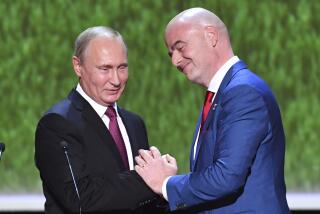World Cup: Winning changes everything for once-ridiculed Russian national team
Reporting from moscow — Maybe Vitaly Milonov was right. Maybe all the jokes and sarcastic songs and abuse heaped on the Russian national team heading into the World Cup were misplaced.
Once dismissed as something of a national embarrassment, the Russian team has become a national treasure heading into Monday’s group-stage finale with Uruguay. It is already assured of a spot in the knockout stage of a World Cup for the first time since the dissolution of the Soviet Union, while the eight goals it scored in its first two games are tied for most in the tournament, and the most scored in the first two games by a World Cup host since 1934.
So maybe Milonov was simply ahead of his time when he joined a group of lawmakers in drafting a bill that would impose a fine of 10,000 rubles (about $160) on anyone who criticized the team. It turns out he need not have bothered; the team silenced the critics on its own.
“No one believed we could do it, but now we are,” Lev Golovchenko, 19, said Saturday as he accompanied three friends to the World Cup Fan Fest near Moscow State University. Russia wasn’t even playing that day but the foursome were wearing Russia team shirts and carrying the tricolor flag.
“I didn’t really care about soccer before this,” Golovchenko said. “I mean, I know the teams but I don’t follow them. But now I’m really proud of my country.”
Russia was ranked 70th in the world coming into the World Cup, worst of the 32 teams, and looked like a good bet to become just the second host country, after South Africa in 2010, to exit the tournament in the group stage.
The team had gained little traction under Stanislav Cherchesov, a bald and burly former national team goalkeeper hired as coach in 2016 with the goal of getting Russia to the World Cup semifinals. Considering the team hadn’t won a World Cup game since 2002, walking to the moon seemed a more achievable target.
The team won just five times in Cherchesov’s first 20 games and appeared to be coming apart when midfielder Denis Cheryshev, who was born in Russia but raised in Spain, declined to speak Russian and talked only with Spanish-speaking reporters on the eve of the World Cup.
So the sense of self-deprecation and defensiveness ahead of the tournament was understandable, with one prominent blogger dismissing the team as “abysmal” and “very weak.”
But all was forgiven when Cheryshev came off the bench to score two goals in Russia’s opening-game rout of Saudi Arabia. During the postgame news conference, Cherchesov, once among the most maligned men in the country, hurried out of the room to take a congratulatory call from Vladimir Putin, Russia’s president.
Complete coverage of the 2018 World Cup »
And when Russia followed that with a win over Egypt five days later, clinching a spot in the second round, fans paraded through the streets and Metro stations of Moscow and St. Petersburg, singing, chanting and blowing car horns. Roads were blocked by cars full of flag-waving Russia fans as Mexicans, Poles and Brazilian bystanders were quickly sucked into the celebration.
The usual criticism of the team on social media, the Moscow Times reported, immediately gave way to a flashmob launched under the hashtag #pereobuvayemsa, which translates as “now we’re changing our shoes,” a play on the Russian idiom for changing one’s mind quickly.
“It’s a true fever. Even my mother watches every game,” said Inna Kiyasova, a soccer fan who’s been taken by surprise by her country’s reaction to a sport she’s been following for years.
Kiyasova doesn’t expect Russia’s run through the tournament to last much longer, but she plans to enjoy it while she can.
“Russia’s game and its quality is overrated,” she said. “I don’t support the massive hysteria and happiness, but it’s definitely cool that Russia is in playoff for the first time ever.”
Which brings us back to Milonov, who until now was best known as the author of Russia’s homophobic law against gay “propaganda.” Four days after the World Cup opened, Milonov told the Associated Press that he was pushing another law that would protect Russian soccer players against the “very brazen, ugly, fake and dirty” criticism that has been hurled at the team.
Turns out winning has made that unnecessary.
[email protected] | Twitter: @kbaxter11







